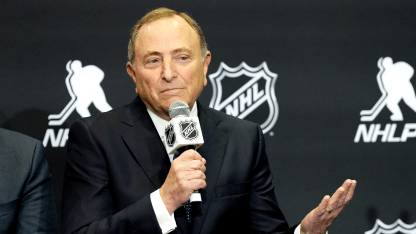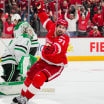MANALAPAN, Florida -- NHL general managers completed three days of meetings Wednesday, and Commissioner Gary Bettman said the group is leaving with a sense of the game being in a good place with strong revenues and exciting races for the Stanley Cup Playoffs.
"We talked about a lot of little tweaks that we can focus on to maybe make things a little bit smoother, but nothing that I would categorize as problems," Bettman said. "I think we're in a good place and we're looking forward to the stretch drive and beginning the playoffs."
On Tuesday, the GMs voted to propose several minor adjustments to rules, including allowing penalties subject to coach's challenges to include delay of game penalties for pucks shot over the glass and certain high-sticking minors.
The proposals next go to the NHL/NHLPA Competition Committee for approval before the NHL Board of Governors for ratification.
Bettman and deputy commissioner Bill Daly touched on a number of other topics in their post-meeting press conference.
Long-term injured reserve
This topic was not on the agenda at the meetings because it is a collectively bargained issue that involves the NHL Players' Association, but the usage of LTIR for injured players as it relates to the salary cap was discussed Sunday when the six members of the GMs' executive committee met with Bettman and Daly.
Daly said the topic came up briefly and he told the members of the executive committee to speak to the entire group of GMs to take their pulse on it and if they believe it needs to be addressed.
The executive committee, which is in its second year of existence, is comprised of Doug Armstrong (St. Louis Blues), Kevin Cheveldayoff (Winnipeg Jets), Steve Yzerman (Detroit Red Wings), Lou Lamoriello (New York Islanders), Ken Holland (Edmonton Oilers) and Don Waddell (Carolina Hurricanes).
"It came up literally for maybe 90 seconds, and that's what I threw out as a possible way for us to talk about it," Daly said. "So, they undertook it to talk to the managers and they're going to get back to us."
Bettman said he does not believe any team is abusing the LTIR provision that allows it to exceed the salary cap, if necessary, if it has players on LTIR.
He said the NHL monitors players on LTIR closely, particularly in instances of using it to replace players leading into the playoffs. Daly said the League uses an independent third-party physician to confirm medical records and will do a physical examination if necessary.
"Bona fide injuries and doing what we need to do to satisfy ourselves that these injuries have been bona fide for the period of time that LTI was applicable," Bettman said.
There is no salary cap in the playoffs, so after the regular season teams are able to active a player off LTIR without cap constraints provided he has met the requirements of LTIR, which is missing 10 games and 24 days.
"I think everybody is satisfied that at least until this point there hasn't been game playing in that regard," Bettman said. "The Collective Bargaining Agreement was negotiated almost 20 years ago and there were certain provisions that were put in, which at the time made sense and continue to make sense. If it were to be abused that would obviously be something we want to address with the Players' Association."
Daly said he informed the NHLPA that LTIR would be a topic of conversation at the meetings this week.
"They're aware and we'll see how, if at all, we need to address it," Daly said.
4 Nations Face-Off
Daly outlined a schedule for next season's 2025 NHL 4 Nations Face-Off that will feature the United States, Canada, Sweden and Finland from Feb. 12-20.
The last NHL games before the 4 Nations Face-Off will be Feb. 9, which is Super Bowl Sunday. The four teams competing will practice Feb. 10-11, and the tournament begins Feb. 12.
Daly said the two North American cities hosting the tournament haven't been finalized yet, but the League is close to doing so.
Players not competing in the 4 Nations Face-Off will have an eight-day break from Feb. 9-17 before returning to practice with their NHL teams Feb. 18.
The NHL schedule will resume Feb. 22.
Projected revenues
Bettman said the projected hockey-related revenue for the 2023-24 season is $6.2 billion. HRR is always calculated in U.S. dollars.
"It's pretty much in line with what we were expecting," Bettman said. "We were expecting a strong, vibrant season and it has been that from a business standpoint."


















